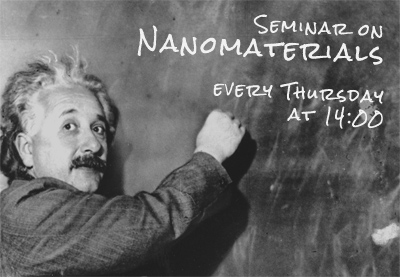Nanoseminar
Group of Structure analysis at the Department of Condensed Matter Physics
of Charles University and MGML has a pleasure to invite you to attend the seminar on nanomaterials: Physics, Technology, Applications
on 23rd March 2023 at 14:00
at Faculty of Mathematics and Physics of Charles University, Ke Karlovu 5, 121 16 Praha 2
Lecture room F2
Tomáš Kmječ
Department of Low Temperature Physics, Faculty of Mathematics and Physics, Charles University, Prague, Czech Republic
X-ray fluorescence - a valuable method for determination of the chemical composition and its problems in scientific practice
Tomáš Kmječ » X-ray fluorescence - a valuable method for determination of the chemical composition and its problems in scientific practice
Department of Low Temperature Physics, Faculty of Mathematics and Physics, Charles University, Prague, Czech Republic
Corresponding author: e-mail: kmjec@mbox.troja.mff.cuni.cz
Location: Lecture room F2, MFF UK, Ke Karlovu 5
Energy-dispersive X-ray fluorescence (EDXRF) is a non-destructive analytical method for qualitative as well as “quantitative” determination of elements in a sample, independent of their chemical form. It is built on the fact that elements that are irradiated with high-energetic X-rays have a certain probability of emitting characteristic X-rays, the energies of which are unique for each element.
The use of the EDXRF technique has accelerated since the 1960s as a result of the development of liquid nitrogen-cooled solid-state detectors, nuclear electronics, and small computers. Contemporary small EDXRF spectrometers are very simple, handy, and sensitive tools for daily laboratory practice [1].
EDXRF is multi-elemental and nondestructive and can be applied to large as well as small samples of different compositions and characters, without special conditions and sample preparation.
The principles of the EDXRF method are summarized in the presentation. Comparison between EDXRF, SEM/EDS, and further chemical methods are illuminated.
Selected problems and their solving in the qualitative and (semi)quantitative EDXRF in scientific practice are presented. Real examples of method applications, a special setup of methods, and problematic results from scientific practice are presented.
References
[1] HASCHKE, Michael, Laboratory Micro-X-Ray Fluorescence Spectroscopy Instrumentation and Applications. Berlin: Springer International Publishing. Springer Series in Surface Sciences, 2014, ISBN 978-3-319-04863-5. doi:10.1007/978-3-319-04864-2.


